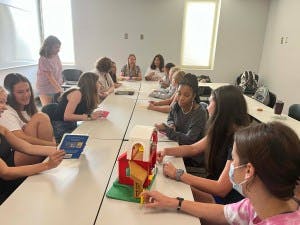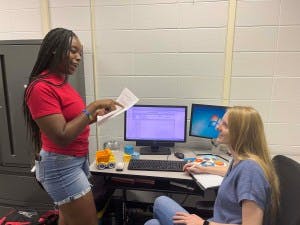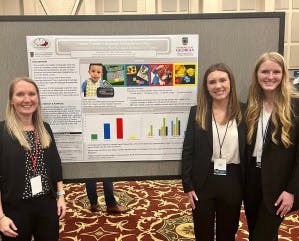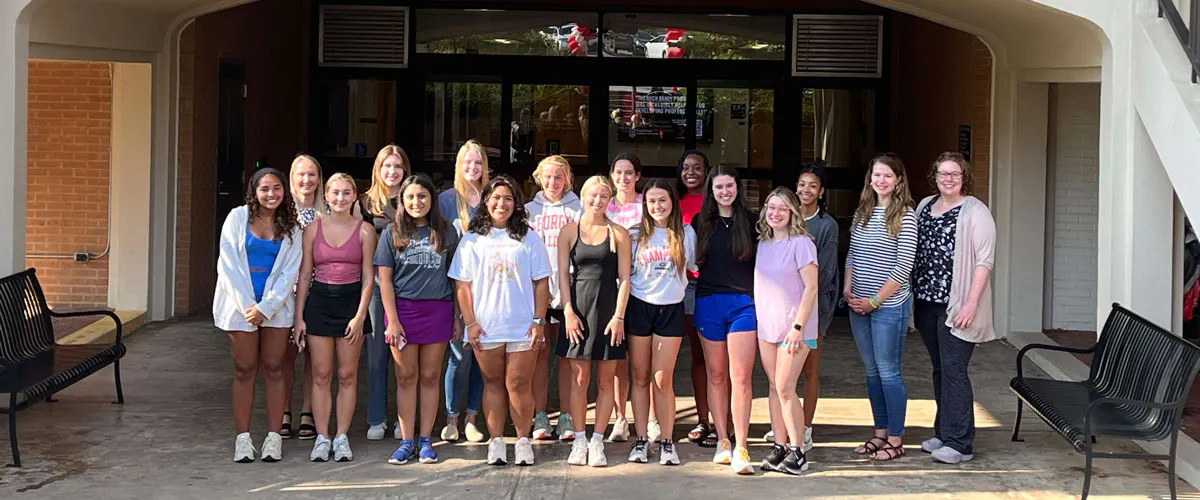Empowering caregivers
Students interested in investigating and understanding child language disorders are putting their passion into practice.
Housed in the UGA Mary Frances Early College of Education, the Child Communication Lab (CCL) is a collaborative research hub led by Jennifer Brown, associate professor and graduate coordinator in the Department of Communication Sciences and Special Education.
The lab offers students at various stages of their college careers the opportunity to not only conduct and analyze research, but to apply what they’ve learned through their research studies into real-world practice.

“When people think about research to practice, they’ll say that there’s a gap,” says Brown. “We need what people are doing in early intervention to be informing our research, and our research needs to be examining things that are doable for early intervention providers.”
Established in 2018, the CCL helps close this gap by integrating research, practice, and professional development to improve communication outcomes for children with identified language disorders or a likelihood for language disorders, as well as children developing language typically.
Undergraduate students interested in research can take a directed course with Brown, who guides and oversees their work on various research projects, several of which are funded by external grants. These projects often change from semester to semester and are dependent on the research study’s progress.
For example, students may focus on collecting data one semester, while another group of students pick up where the last group left off and analyze that data the next semester. However, all are focused on research that examines and enhances collaborative practices involving parents, caregivers, and teachers, in natural environments, such as the home, community, or school.
“I opened the lab up to undergraduate students who are interested in learning more about research and early communication with young children—infants, toddlers, preschoolers, and occasionally early school-age children,” says Brown. “We’re looking at exploring ways to improve young children’s communication.”
What helps children learn language?

Some of the lab’s ongoing research, practice, and professional development projects include:
- Embedded intervention strategies and caregiver coaching
- Influence of materials, routines, and activities on parent-toddler communication
- Scholarship of teaching and learning related to communication sciences and disorders
- Interprofessional education and practice
The team’s findings suggest that electronic toys may be less educational than traditional toys like puzzles, blocks, cars, books, and more, for young children. Specifically, electronic toys marketed as educational often lack the back-and-forth language interaction that researchers and practitioners know supports foundational language outcomes in young children.
“That difference doesn’t mean that if a child enjoys playing with those toys that those choices are wrong or bad,” says Brown. “But the toys may not be meeting the goal that they’re being marketed to achieve, which is where the concern comes in because parents are thinking they’re doing what’s best for their child and buying the thing that’s going to help them learn.”
CCL students—which include undergraduate, master’s, and doctoral students—also learn about family-guided routines-based intervention, which is a framework for early interventionists coaching caregivers on how to engage their children in learning as they participate in everyday routines and activities.
“The collaborative natural environment focus of our work is unique,” says Brown. “We are collaborating with and coaching parents, extended family members, preschool teachers—whoever is in that broader category of caregivers—because those are the people who spend time with kids throughout the day. We can leverage the knowledge we have as interventionists by supporting these people.”
What the future holds

Brooke Apple (B.S.Ed. ’23, M.A. ’25) and Madison St. Clair Statham (B.S.Ed. ’23, M.A. ’25) joined the Child Communication Lab as undergraduate students.
Today, they’re conducting research with Brown as master’s students in the College’s communication sciences and disorders program.
As undergraduate students, Apple and Statham conducted research on parent-child communication and coded data to analyze the words parents and children use when playing with different types of toys. They presented their findings at UGA’s spring 2023 Center for Undergraduate Research Opportunities (CURO) Symposium.
“Working with Dr. Brown and learning from her expertise furthered my knowledge of the research process and helped me better understand why research is so vital to our profession,” says St. Clair. “One of my goals over the next two years of my graduate program is to become a clinician who implements evidence-based practice to best serve my clients.”
The pair’s CURO project investigated content-specific words parents and children use when playing with four different types of toys:
- Traditional toys (shape sorters, puzzles)
- Electronic educational toys (phones, talking farms)
- Picture books (board books with animals and shapes)
- Functional and emerging pretend play (tea sets, trucks)
“Through the Child Communication Lab, I discovered my interest in conducting research and am excited to continue cultivating this passion as a graduate student,” says Apple. “Working in the lab challenged me to think outside the box and has given me the opportunity to take initiative in investigating concepts that intrigue me. If anything, my involvement in the lab has expanded the spectrum of possibilities for my professional career.”
